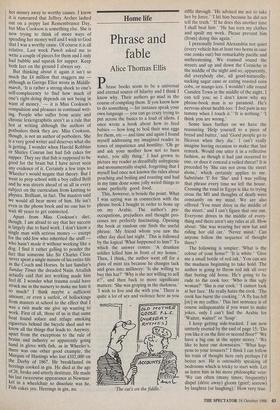Home life
Phrase and fable
Alice Thomas Ellis
Phrase books seem to be a universal and eternal source of hilarity and I think I know why. Their authors go mad in the course of compiling them. If you know how to do something — for instance speak your own language — you can go crazy trying to put across the basics to a load of idiots. I once wrote a book about how to feed babies — how long to boil their wee eggs for them, etc — and time and again I found myself addressing my imagined reader in tones of impatience and hostility: `Oh go and ask your mother how not to burn water, you silly thing.' I had grown to picture my reader as dreadfully unhygienic and monumentally stupid, forgetting that I myself had once not known the rules about poaching and boiling and roasting and had in my time done some jolly weird things to some perfectly good food.
This, however, is beside the point. What I was saying was in connection with the phrase book I bought in order to bone up on my Arabic. The author's pre- occupations, prejudices and thought pro- cesses are perfectly fascinating. Opening the book at random one finds the useful phrase: `My friend whom you saw the other day died last night.' This is followed by the logical `What happened to him?' To which the answer comes: `A drunken soldier killed him in front of my house.' Then, I think, the author went off for a glass of mint tea because he changes tack and goes into millinery: `Is she willing to buy this hat?' Why is she not willing to sell it?', and then back to more significant matters: 'She was groping in the darkness.' `I wish to live and die with you.' There is quite a lot of sex and violence here as you
The cat's on the fiddle.'
riffle through. `He advised me not to take her by force.' I hit him because he did not tell the truth.' If he does this another time I shall beat him.' He has torn my clothes and spoilt my work. Please prevent him (from) doing this again.'
I personally found Alexandria not quiet (every vehicle has at least two horns in case one conks out) but remarkably pacific and unthreatening. We roamed round the streets and up and down the Corniche in the middle of the night and so, apparently, did everybody else, all good-naturedly, sucking sugar cane or eating roasted corn cobs, or mango ices. I wouldn't idle round Camden Town in the middle of the night,! can tell you; so I don't know why my phrase-book man is so paranoid. He's nervous about health too: `I feel pain in my tummy when I touch it.' It is nothing.' I think you are wrong.'
Some lines further on we have the reassuring `Help yourself to a piece of bread and butter,' and `Good people go to Heaven when they die.' I can't really imagine having occasion to make that last remark. Would one utter it in a reflective fashion, as though it had just occurred to one, or does it conceal a veiled threat? It is preceded by `She can not cross the street alone,' which certainly applies to me. Substitute `I' for `She' and I was yelling that phrase every time we left the house. Crossing the road in Egypt is like to trying cross the M1 and thoughts of death were constantly on my mind. We are also offered `You must drive in the middle of the street,' and I can't figure that one out. Everyone drives in the middle of every- thing and there aren't any rules at all. How about: `She was wearing her new hat and riding her old car.' Never mind.' Can anyone follow the sequence of thought there?
The following is simpler:, `What is the colour of your horse?' It is white.' Give me a small bottle of red ink.' You can see the madness beginning to take hold. The author is going to throw red ink all over that boring old horse. He's going to be rude to the cook too: `Who is this ugly woman?' She is our cook.' I cannot look at her face.' He really hates the cook. `The cook has burnt the cooking.' A fly has fell [sic] in my coffee.' This last sentence is of course indispensable if you want to make jokes, only I can't find the Arabic for `Waiter, waiter!' or 'Soup'.
I keep getting side-tracked. I am now untterly riveted by the end of page 15: `Do you like it on the first or second floor?' We have a big one in the upper storey.' We like to have one downstairs.' What hap- pens to your trousers?' I think I can follow his train of thought here only perhaps I'd better not. He is ostensibly speaking of bedrooms which is tricky to start with. Let us leave him in his more philosophic vein: 'We can often (many times; frequently) dispel (drive away) gloom (grief; sorrow) by laughter (or laughing): How very true.


















































 Previous page
Previous page